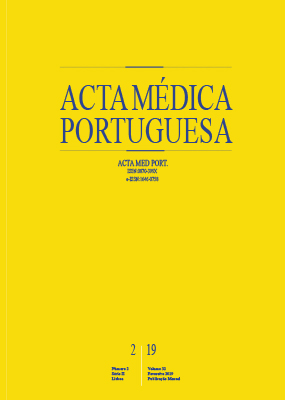Prescribing of Non-Steroidal Anti-Inflammatory Drugs to Patients with Diabetes Mellitus in Portugal
DOI:
https://doi.org/10.20344/amp.10815Keywords:
Angiotensin-Converting Enzyme Inhibitors, Angiotensin Receptor Antagonists, Anti-Inflammatory Agents, Non-Steroidal, Diabetes Mellitus, Renal Insufficiency, ChronicAbstract
Introduction: Portugal presents the highest incidence of stage 5 chronic kidney disease in Europe. It is speculated that a high consumption of non-steroidal anti-inflammatory drugs (NSAIDS) may contribute to this high incidence. Our aim was to characterize the prescription of non-steroidal anti-inflammatory drugs to patients with diabetes mellitus in Portugal.
Material and Methods: We analyzed the national prescription database in triennium 2015 - 2017. In patients with diabetes mellitus, we evaluated the prescription of non-steroidal anti-inflammatory drugs according to age, gender and region of the patient and specialty of the prescribing physician. We evaluated the prescription of non-steroidal anti-inflammatory drugs in all patients with diabetes mellitus, in patients with presumed renal impairment, and in those with concomitant prescription of angiotensin converting enzyme inhibitors or angiotensin receptor antagonists.
Results: We analyzed 23 320 620 prescriptions, corresponding to 610 157 adults, including 104 306 patients with diabetes mellitus. The most prescribed non-steroidal anti-inflammatory drugs were ibuprofen (20.1%), metamizole (14.7%), and diclofenac (11.4%). The prescription of non-steroidal anti-inflammatory drugs was higher in females, in patients aged 51 - 70 years and in the Alentejo region. Non-steroidal anti-inflammatory drugs were prescribed to 70.6% of patients with diabetes mellitus, from which 10.6% were prescribed ≥ 10 packages during the three years. Among patients with diabetes mellitus on angiotensin converting enzyme inhibitors/angiotensin receptor antagonists and with presumed reduction in kidney function, 69.3% were prescribed non-steroidal anti-inflammatory drugs and 11.5% were prescribed ≥ 10 packages during the three years.
Discussion: The level of prescribing of non-steroidal anti-inflammatory drugs to patients with diabetes mellitus is high. The concern of reducing non-steroidal anti-inflammatory drugs prescription to patients already on angiotensin converting enzyme inhibitors/angiotensin receptor antagonists and/or decreased renal function does not seem to exist.
Conclusion: In Portugal, the level of prescribing of non-steroidal anti-inflammatory drugs to patients with diabetes mellitus should be reduced, particularly in the subgroups identified with higher prescription and with higher risk of progression to stage 5 chronic kidney disease.
Downloads
Downloads
Published
How to Cite
Issue
Section
License
All the articles published in the AMP are open access and comply with the requirements of funding agencies or academic institutions. The AMP is governed by the terms of the Creative Commons ‘Attribution – Non-Commercial Use - (CC-BY-NC)’ license, regarding the use by third parties.
It is the author’s responsibility to obtain approval for the reproduction of figures, tables, etc. from other publications.
Upon acceptance of an article for publication, the authors will be asked to complete the ICMJE “Copyright Liability and Copyright Sharing Statement “(http://www.actamedicaportuguesa.com/info/AMP-NormasPublicacao.pdf) and the “Declaration of Potential Conflicts of Interest” (http:// www.icmje.org/conflicts-of-interest). An e-mail will be sent to the corresponding author to acknowledge receipt of the manuscript.
After publication, the authors are authorised to make their articles available in repositories of their institutions of origin, as long as they always mention where they were published and according to the Creative Commons license.









